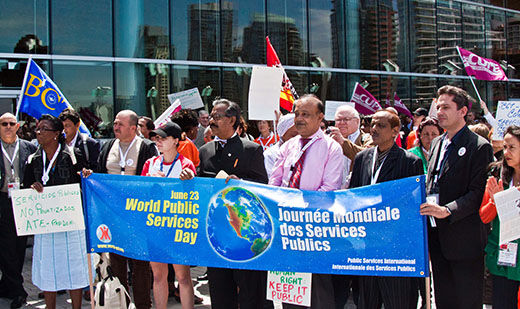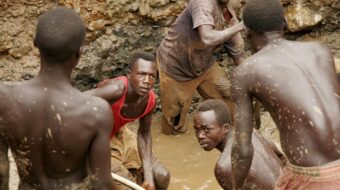
Last month’s congress of the International Trade Union Confederation (ITUC), in Vancouver, Canada was an eye-opener. It is obvious from any national perspective that the global economic crisis is challenging labor in every country to shift gears and rethink how to fight. But this congress gave a clear picture of how the crisis is bringing to life “workers of the world unite” in real time.
As discussion in the ITUC congress made clear, many of labor’s most critical battles can only be won with a global fight. These issues critical to world labor will be fought out not only economically, but politically as well, requiring new levels of international trade union unity and solidarity.
In the first place, global finance capital has never been more free and more agile to move about the globe in search of plunder and profit. It is this global mobility that means highly dangerous and risky hedge fund bets on bundled subprime loans in the US can shake big banks around the world.
The ITUC congress took the view that more controls on finance capital is a must. Not only in each country, but also that world labor needs to champion international regulations on banking and finance. There was much discussion and debate on how labor can be more of a global player. Many called for fighting for a seat at the table of the International Monetary Fund, the World Bank and other existing international finance institutions. No delegates thought this would be easy, but all called for struggle to democratize these international finance institutions and mass struggle for labor’s voice at all levels of planning and decision making.
Others called for greater use of, and more power for the United Nation’s International Labor Organization (ILO) because labor already has a seat at that table. They noted that the ILO is more independent of corporate and banking capital control and provides a voice for labor from both developed and developing countries.
There was also much discussion of the need for labor in every country to fight for ratification of the ILO conventions. The US has not ratified all of them. And as some in the AFL-CIO have pointed out, ratification of the ILO’s “freedom of association” convention would mean the need to repeal “Right-to-Work” (for less) laws in the U.S.
Another big theme of the congress was the need for massive public spending on new green technologies and industries to spur growth and development. Speaker after speaker rejected right-wing mantras by the deficit hawks in their countries and instead demanded public spending to build for people’s needs and to put money in the pockets of working people as the way out of the crisis.
Perhaps the most unified position of the congress was on the need for taxing big business and finance capital to pay for putting people back to work and ending the crisis. Many echoed AFL-CIO president Richard Trumka, when he said that the bankers and speculators who caused the crisis must pay to clean up their mess. Most cited the need for national, and even international, stock transaction taxes to fund jobs and put controls on risky investments.
A thread that ran throughout the discussion was the call for a “new global economic order.” Delegates spoke of reigning in capital and putting economic justice and the rights of working people first. And as one of the delegates from Germany said to me in private, that economic order has a name, it’s socialism.
This congress was not just a talk fest. The call to action was clear. Perhaps the most dramatic example was concrete plans for a European Union wide demonstration, September 29th against austerity programs, cuts in social programs and wage and benefit cuts for workers. The Spanish delegates announced united action by all the union federations and the left for a general strike on that day, while other countries were also exploring the possibility for general strike action.
During the congress, at a special meeting for the US delegation, the United Steelworkers and the Los Mimeros (the National Miners Union of Mexico) discussed their plans to merge the two unions creating the first North American wide industrial union. This merger arises out of concrete joint struggle against giant companies operating throughout the continent. Speakers pointed out the need for united action regardless of national borders against giant corporations that respect no national boundaries for profit and exploitation.
Another important development at the congress was the election of Sharan Burrows, past president of the Australian Council of Trade Unions, as general secretary of the ITUC, its highest office. She is the first woman to hold the post and continues an international trend in labor like the election of Arlene Holt Baker and Liz Schuler to two top offices of the AFL-CIO in 2009.
I came away from this congress of the ITUC with two basic conclusions. First it is clear that there is a rising tide of labor militancy, unity and action everywhere. It is a rising tide that is gathering power and class consciousness.
Secondly it is also clear that the time for global labor unity is now. The ITUC, like most labor organizations represents many different political trends from left to right including communists, socialists and labor conservatives. It can be no other way as trade unions are mass organizations that must represent all workers. All unions struggle for unity in action. Democratically overcoming political differences in order to present a united collective face is critical to winning for workers; from bargaining to political action.
It is time to heal the cold war split in labor. This requires all sides getting over past differences and uniting based on common action and immediate fightback. It further requires conscious initiatives and action from the leadership of all global labor federations for unity. An important model can be found in the work of many of the specific trade federations, like metalworkers and transportation, that include unions affiliated with many of the main global federations including both the ITUC and the World Federation of Trade Unions (WFTU).
“Workers of the World Unite” cannot be just the slogan of the left. Now more than ever in today’s world where global capital cruises the world in search of plunder and profit, workers of the world united is a must for economic and social justice.
Photo: Scott Marshall

MOST POPULAR TODAY

Zionist organizations leading campaign to stop ceasefire resolutions in D.C. area

High Court essentially bans demonstrations, freedom of assembly in Deep South


Afghanistan’s socialist years: The promising future killed off by U.S. imperialism

Communist Karol Cariola elected president of Chile’s legislature






Comments